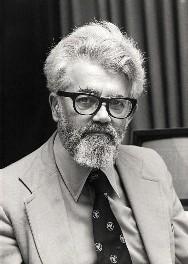
John McCarthy is universally recognized as one of the fathers of "artificial intelligence," (AI) a phrase he coined to denote the field of research he significantly helped to define. He believes that "intelligence can, in principle, be so precisely described that a machine can be made to simulate it." His research focused on teaching a computer to do a variety of tasks, which necessitated developing a computer language that would manipulate symbols for objects, rather than perform arithmetic on numbers. LISP, the language he then developed, is the language used in most expert systems and natural language programs today.
McCarthy was one of the first to propose and design time-sharing computer systems, and he pioneered the application of mathematical logic to prove the correctness of computer programs. The mathematician is a member of the National Academy of Sciences, the National Academy of Engineering, and the American Academy of Arts and Sciences. McCarthy received the Association for Computing Machinery's prestigious Turing Award, the National Medal of Science, and the Kyoto Prize, and he won the first research excellence award of the International Conference on Artificial Intelligence.
McCarthy earned his B.S. in mathematics from the California Institute of Technology in 1948 and his Ph.D. from Princeton in 1951. He has won numerous awards including the Kyoto Prize and the National Medal of Science. He is a member of the American Academy of Arts and Sciences, the National Academy of Engineering and the National Academy of Sciences.
Dr. McCarthy realized that computer users do not monopolize a computer's processing ability, leading to his development of time-sharing programming.
Instead of trying to simulate the brain's complicated pathways, Dr. McCarthy applied a system of logic to computers to develop artificial intelligence.
In 1958, Dr. McCarthy developed LISP, a programming language for early computers, at a time when other languages could only manipulate numbers.
Information as of April 2003

